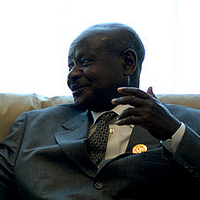KAMPALA, Uganda -- When Ugandan President Yoweri Museveni seized power 25 years ago, he brought order to a nation that was reeling from two decades of crisis.
After the terror-filled reigns of Idi Amin and Milton Obote, Museveni ushered in an era of relative prosperity. The West was quick to brand Uganda a rare "African success." Praised for tackling HIV/AIDS, promoting women's rights and pursuing growth through the Washington Consensus of fiscal discipline and free markets, Museveni gained acclaim as a "New African Leader": a bush soldier turned democrat, poised to steer his continent in a new direction.
But in advance of Uganda's Feb. 18 election, in which Museveni will seek another five-year term in office, the liberation icon and aid-world darling has lost much of his luster. After a quarter-century in power, the 66-year-old president is increasingly seen at home and abroad as a leader who has overstayed his welcome -- one who continues to preach the virtues of democracy, while violently sidelining threats to his power and heading a system rife with corruption.

